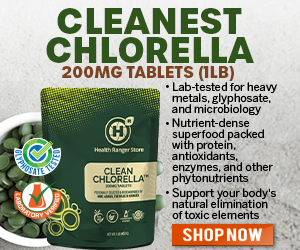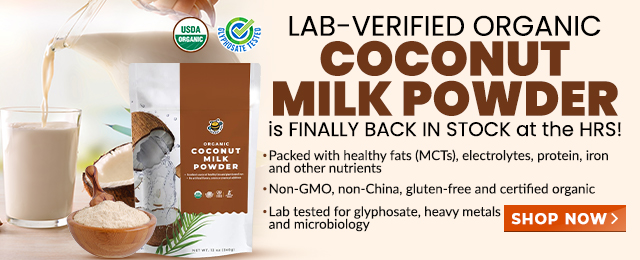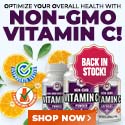
Six easy, natural ways to boost your immune system for flu season
Wednesday, October 09, 2013 by: J. D. Heyes
Tags: flu season, immune boost, zinc
- Newly released JFK files reveal Pentagon's role in creating Lyme disease and covid in the same lab
- Oncologist warns of ‘terrifyingly aggressive’ cancers in children, linked to immune suppression from COVID vaccines
- Trump administration CUTS FUNDING to Gavi, the Vaccine Alliance - a major blow to the Bill Gates-backed entity
- NIH study, buried for decades, reveals that Flu Shots INCREASE elderly deaths, not prevent them
- Health Ranger Report: Ashton Forbes discusses TELEPORTATION ORBS and their role in MH370 disappearance
- Musk targets “strangely wealthy” lawmakers in DOGE probe, names Pelosi, McConnell, Schumer
- Millionaire fitness coach charged in Tesla vandalism incident as anti-Musk attacks escalate
- COVID-19 scandal linked to CANCER SURGE: Billionaire researcher sounds alarm
- EPA banned chemical linked to cancer, Parkinson's and fatal heart defects in babies - now industry is lobbying to get it reinstated
- “Ethically sourced” human “bodyoids” could usher in a new era of medical exploitation, raising disturbing ethical questions
- Woman contracts WORLD'S DEADLIEST VIRUS after unknowingly being given the WRONG VACCINE
- At least 75 percent of Americans are unknowingly MEDICATED FOR STUPIDITY by fluoridated water – Utah now banning it
- Civil war is here – Multiple events, from conservatives being “swatted,” to attacks against Telsa owners, happening across America as Dem politicians are telling supporters to ‘fight in the streets”
- DARPA: The shadowy innovator behind the world’s most advanced military technologies
- Tackling the rubber waste crisis: Groundbreaking study reveals eco-friendly method to recycle tires
- Ancient kitchen secrets REVEALED: How garlic, ginger and green onions fight cancer and heart disease
- U.K. unveils controversial pandemic preparedness tool: A double-edged sword?
- Homesteading Boom: How families are escaping cities to grow their own food
- Newly released JFK files reveal Pentagon's role in creating Lyme disease and covid in the same lab
- Analysis: The coming economic collapse, a mass uprising and Trump's three secret weapons to halt the growing revolt
- Trump's greatest betrayal so far: Accelerating Middle East wars, silencing dissent, and serving Zionist masters
- CDC finally halts $11 billion COVID funding scam as health officials admit the ‘pandemic’ was a fraud
- The hidden dangers in your kitchen: How cooking methods impact diabetes, cancer and aging
- Kiss Your Genetic Privacy Good-Bye! 23andMe Gets Green Light to Sell Your Intimate Genetic Details to Anyone They Want
- DEADLY DECEPTION: How COVID vaccines increased mortality rates and why authorities hid the truth
- Dr. Suzanne Humphries makes bombshell appearance on Joe Rogan podcast, exposing vaccine industry deception back to POLIOMYELITIS
- Trump nominates VACCINE ZEALOT Susan Monarez to lead the CDC, sidelining RFK Jr.'s reform efforts
- Here are TEN all-natural ways to protect your garden without using harmful chemicals
- Woman contracts WORLD'S DEADLIEST VIRUS after unknowingly being given the WRONG VACCINE
- Senate Democrats deny censorship industrial complex existed, defend government's role in silencing dissent
- Black cumin seed oil emerges as a powerful ally against breast cancer and chronic inflammation
- Sugar-free deception: Artificial sweeteners hijack hunger signals, fuel obesity epidemic, study warns
- “Independent” anti-Russia outlet MEDUZA faces COLLAPSE as US funding dries up
- The Health Ranger releases “Vaccine Zombie” song and music video, using AI-animated zombies for the music video
- Discovery of vast underground city beneath Giza pyramids challenges human history
- Key nodes of Federal Government censorship
- Newly released JFK files reveal Pentagon's role in creating Lyme disease and covid in the same lab
- California's social media censorship law struck down: A victory for free speech or a threat to online safety?
- EPA advisor admits the agency is funneling billions to climate groups ahead of Trump’s return to White House
- The Health Ranger releases “Vaccine Zombie” song and music video, using AI-animated zombies for the music video
- Dr. Mike Yeadon releases 15-minute testimony - WATCH - about genocidal intent of COVID “vaccines”
- Florida takes a stand: DeSantis proposes permanent ban on mRNA vaccine mandates
- “Why we influenced the 2020 elections”: Facebook files reveal the coordinated effort to bury the Hunter Biden laptop story
- Mike Adams releases country western hit single: Goin’ Back in Time is Comin’ Home
- The pandemic as a tool for INDOCTRINATION: Understanding “The Indoctrinated Brain” by Dr. Michael Nehls
- Unpacking the Lies That We’ve Been Fed – new song and music video released by Mike Adams, the Health Ranger
- Mike Adams releases music poetry sensation: A Child of God
- House Intelligence Committee calls for the ARREST and PROSECUTION of Dr. Anthony Fauci
- Rep. Nancy Mace introduces bill to ban biological males from female facilities on federal property
- Michigan sheriff announces criminal investigation into 2020 election crimes, Dominion Voting Systems
- Peter Rost exposes Big Pharma corruption in his book “The Whistleblower: Confessions of a Healthcare Hitman”
- Migrants are taking advantage of recent hurricanes to scam residents and loot their homes
- Sugarcane extract superior to cholesterol-lowering drugs?
- Survival 101: Effective EMF blocking techniques
- Red Cross issues warning to stop blood plasma donations from vaccinated people
- Scientists confirm: GENIUS brain function can be spontaneously unleashed in humans without any apparent cause
- EPA advisor admits the agency is funneling billions to climate groups ahead of Trump’s return to White House
- HYSSOP: What research reveals about the health benefits of this ancient holy herb
- Two containers with completed ballots fall out of truck in Florida
- Fully vaccinated about to see “tsunami” of illness and death, warns virologist
- Global leaders unite to clamp down on “misinformation” with UN-backed Cascais Declaration
- BREAKING: 2025 NDAA authorizes mandatory military draft of WOMEN across America… as Pentagon pursues global NUCLEAR war with both Russia and China at the same time
- Michael Yon warns of a ZIONIST TAKEOVER in Trump’s second administration
- BOMBSHELL: DNA testing kits are a SCAM to develop ethnic-specific bioweapons
- Ozempic and Wegovy weight loss drugs are injectable LIZARD VENOM PEPTIDES that may unleash a devastating wave of organ failure… side effects align with symptoms of SNAKE BITES
- Israeli soldiers accused of even more torture and abuse in the West Bank
- These 13 countries just signed an agreement to engineer a global FAMINE by destroying food supply
- NASA admits that climate change occurs because of changes in Earth’s solar orbit, and NOT because of SUVs and fossil fuels
- RFK Jr. clears key hurdle: Sen. Susan Collins backs controversial HHS nominee, signaling a new era for health policy
- Sermon 30: How Jesus reveals Caesar’s FAKE CURRENCY and FALSE AUTHORITY
- Coriander seeds: Ancient medicine backed by modern science
- Arizona officials claim Maricopa County needs 10-13 days to tabulate results of the election
Boost your intake of vitamin A. "Experts have long known that vitamin A plays a role in infection and maintaining mucosal surfaces by influencing certain subcategories of T cells and B cells and cytokines," says a Harvard Medical School publication, Harvard Health News. "Vitamin A deficiency is associated with impaired immunity and increased risk of infectious disease."
Have some zinc! In addition to vitamin A, zinc has also been found to help ward off sickness by boosting the immune system. In fact, experts note that one of the most common immune deficiencies are lowered levels of zinc. "Pumpkin seeds and lean beef are both a rich source of zinc, while oysters are an excellent source. A recent study among elderly people showed that a multivitamin and mineral supplement improved their immune responses," says Women's Fitness magazine, which also recommended taking magnesium daily - about 400 mg/day - because it "is involved in transmission of nerve impulses within the body." According to Discovery Health, zinc is "involved in the production of at least 300 enzymes and lends a hand in hundreds of body processes, from producing DNA to repairing cells. The mineral can even help us sleep better at night, which provides a host of additional benefits."
Foods containing magnesium include legumes, grains, dark green vegetables, and nuts.
Vitamin C is proven effective. For years, dieticians and nutritionists have been well aware of the immune-boosting qualities extra vitamin C can provide. "Vitamin C is perhaps best known for its ability to strengthen the immune system. But this potent nutrient also has many other important roles that control significant aspects of our health," writes Melissa Makris for NaturalNews. Additionally, vitamin C helps manufacture collagen, which is used by the body as connective tissue to heal wounds more quickly and support the walls of blood vessels, lessening your risk of stroke and heart disease. Vitamin C is also an excellent anti-oxidant, which can neutralize unstable molecules that damage cell walls. You can find vitamin C in lots of good foods - citrus fruits and juices, broccoli, bell peppers, potatoes, strawberries, tomatoes, Brussels sprouts, spinach.
Build up with B6. The B vitamins - B6 and B12 - "do a lot to strengthen and boost the immune system," writes Tommy Fassbender at Yahoo! Voices, noting that a study by the Department of Nutrition and Food Management at Oregon State University recently "found that when women increased their B6 intake from 1.5 milligrams to 2.1 milligrams, their white blood cell count increased by 35 percent."
Men, too, obviously benefit from increased B vitamin intake. "Several studies have suggested that a vitamin B6 deficiency can depress aspects of the immune response, such as lymphocytes' ability to mature and spin off into various types of T and B cells. Supplementing with moderate doses to address the deficiency restores immune function, but mega-doses don't produce additional benefits," says Harvard Medical School.
Adds SteadyHealth.com, "Vitamin B6 works along with other vitamins and micro-nutrients to support the protective activities being undertaken by the immune cells. Deficiency of essential vitamins such as B6 has been associated with suppression of the immunity function which predisposes individuals to infectious disorders."
What about Echinacea? Well, that's a good question. Researchers have long linked the herb to a boost in immune system function. According to the National Institutes of Health, "Echinacea has traditionally been used to treat or prevent colds, flu, and other infections," and "is believed to stimulate the immune system to help fight infections."
The Herb Research Foundation notes: "Echinacea, the purple coneflower, is the best known and researched herb for stimulating the immune system. Thousands of Europeans and Americans use echinacea preparations against colds and flu, minor infections, and a host of other major and minor ailments. This native American herb has an impressive record of laboratory and clinical research. Thousands of doctors currently use echinacea for treating infectious diseases."
And finally, just eat well. A good, balanced diet goes a long way to helping boost your immune system, if for no other reason than to provide many of the very vitamins, minerals and supplements recommended here.
"Our immune systems are being challenged more than ever. The modern lifestyle is, let's just say, not very healthy," says Women's Fitness. "We have some of the poorest eating habits on the planet, we're stressed out, and our environmental pollution is growing on a daily basis. It's no wonder we're seeing more and more allergies, recurrent colds and flus."
Sources:
http://www.health.harvard.edu
http://health.howstuffworks.com
http://www.womenfitness.net/immune-system.htm?utm_source=REFERENCES_R7
http://voices.yahoo.com
http://www.steadyhealth.com
http://nccam.nih.gov/health/echinacea/ataglance.htm
http://www.herbs.org/greenpapers/echinacea.html
https://www.naturalnews.com/032027_vitamin_C_immune_system.html
Flu season at FETCH.news
Get independent news alerts on natural cures, food lab tests, cannabis medicine, science, robotics, drones, privacy and more.
Take Action: Support Natural News by linking to this article from your website
Permalink to this article:
Embed article link: (copy HTML code below):
Reprinting this article:
Non-commercial use OK, cite NaturalNews.com with clickable link.
Follow Natural News on Facebook, Twitter, Google Plus, and Pinterest
Science News & Studies
Medicine News and Information
Food News & Studies
Health News & Studies
Herbs News & Information
Pollution News & Studies
Cancer News & Studies
Climate News & Studies
Survival News & Information
Gear News & Information
News covering technology, stocks, hackers, and more



"Big Tech and mainstream media are constantly trying to silence the independent voices that dare to bring you the truth about toxic food ingredients, dangerous medications and the failed, fraudulent science of the profit-driven medical establishment.
Email is one of the best ways to make sure you stay informed, without the censorship of the tech giants (Google, Apple, Facebook, Twitter, YouTube, etc.). Stay informed and you'll even likely learn information that may help save your own life."
–The Health Ranger, Mike Adams













































